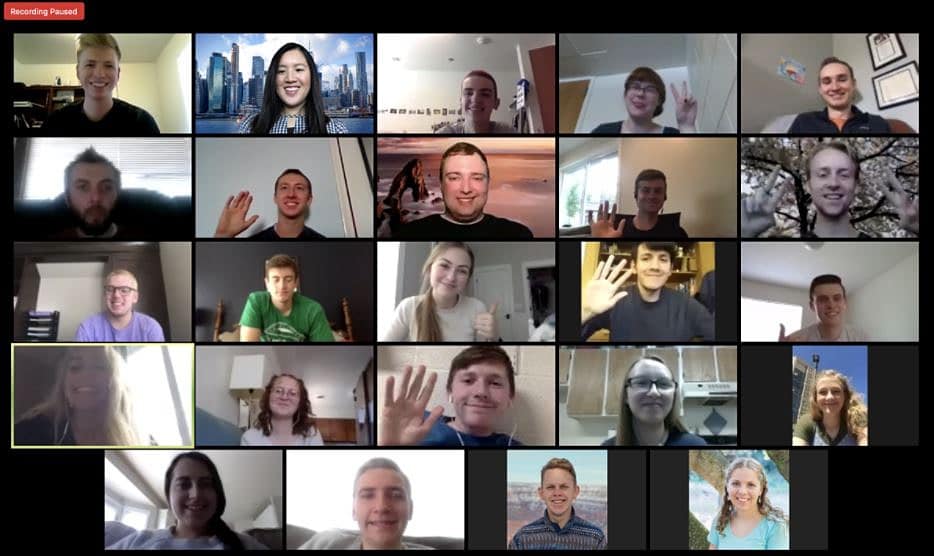Education is going through a massive transition. A long-established structure, largely unchanged since the 19th century, has been forced to finally grasp 21st century technology, plus its attitudes and behaviours, at a comparative overnight pace. Different factors, pressures and outcomes apply to students, teaching staff, and schools, colleges and universities. Through mass online connectivity there are also new learning opportunities available such as Massive Open Online Courses (MOOCs). Additionally, open innovation challenges are a crowd-based innovation for education, stimulating extracurricular ideas and solution innovations from students for rewards other than coursework grades.
The blend online formal courses, MOOCs and prize challenges make an education process available to a more diverse range of students and other participants. This includes women in less open societies; anyone juggling learning with holding down a job; carers with prime responsibility for someone else; the physically less-abled; and older learners possibly lacking confidence to attend in-person.
However, the eventual and belated rush to embrace edtech-based innovation for education at scale has caused difficulties for all stakeholders. Difficulties that the “educational establishment” seeks to overcome through adapting centralised processes and procedures they are very familiar with. Whereas “outsiders” with no vested interests in the current system are more likely to challenge the entire root and branch structure.
Students
Students are the education system’s customers. They can be required to pay a lot for the privilege of tertiary education, as witnessed by the enormous number of would-be students who turn to crowdfunding in their efforts to meet course fees plus living expenses while they study. In England, the average student’s debt on graduation day is thought to be more than £45,000 in maintenance and tuition loans. These are repaid to the government, with added interest, through automated deductions from earnings. However, a recent projection estimated half the loan amounts will not be repaid, and will thus be picked up by the general taxpayers. Half the value of student loans granted in England thus become a crowd debt.

Image source: The Guardian newspaper
However, the restricted provision of acknowledged and accredited centres of tertiary education does not give its customers, the students, much say in how it is delivered. Many believe it would be right and proper to  receive partial refunds due to so much of their learning experience now being online rather than in-person and in group settings. A cohort of students at the Glasgow School of Art in Scotland turned to the crowdfunding platform CrowdJustice in an attempt to raise money to begin legal proceedings. They claim their level of education was not merely reduced, it effectively ended early and reduced their subsequent employment prospects in built environment design and planning.
receive partial refunds due to so much of their learning experience now being online rather than in-person and in group settings. A cohort of students at the Glasgow School of Art in Scotland turned to the crowdfunding platform CrowdJustice in an attempt to raise money to begin legal proceedings. They claim their level of education was not merely reduced, it effectively ended early and reduced their subsequent employment prospects in built environment design and planning.
Others claim that software used to monitor their online activity (such as GoGuardian), are not such a good innovation for education. Intended to check that students are keeping up with their studies, some believe it is too invasive and more like “spyware.” Schools and universities can apply penalties and implement internet access restrictions for what they deem to be “inappropriate behaviour.” Students claim it invades their personal liberties and enforces conformity with standards to which they have had no input. What should the standards be, who should set them, and what degree of screen surveillance is appropriate?
Bricks-and-mortar universities undoubtedly face digital disruption through virtual reality classrooms and automatic grading using artificial intelligence (AI). With increased use of AI to grade their work (a market with a projected value of $17.8bn by 2027), students ask why they should pay the same fees as before, when people were assessing them manually?
Teaching staff
Teachers, tutors and lecturers faced their own upheaval as they had to learn to prepare and deliver coursework online, at the same time as doing it. Inevitably, some performed better than others, with inconsistent performance fuelling students’ claims for fee rebates. Whilst many of us had to master Zoom and Microsoft Teams, and any of the rest of the videoconferencing platforms, few of us had responsibilities such as using them to teach students. For many it was a rushed innovation for education that prevented the identification of best practices before being used.

Image source: LinkedIn, “Tips for Teaching Engaging Classes on Zoom“
The fast response needed to switch to educating online involved a lot of recording of content. Aspects of copyright ownership and infringement remain grey areas. Do the recorded lectures belong to the educators or the institutions that employ them? Who will check they do not infringe someone else’s original copyright? The relevant laws can vary by country, so which legal system would apply to an online classroom with participants and educators located around the world?
Edtech engineers and designers also explain keenly the benefits of data collection through online learning. Each student will be able to build their unique profile of how often and for how long they ask questions or partake in other ways. They can log how long their essays, coursework and assignments took them. Each student’s behaviour will be able to be compared to a class average. Through this data collection, it will be possible to develop more personalized teaching methods for various students to maximize their learning potential.
“One of the problems with mass education today is a lack of personalization and the fact that education has not changed for many years,“ says the founder of NOVA, an AI avatar educational platform. Though at the moment this innovation for education sounds either like an extra workload for the current teachers and tutors, or the educational institutions will need to hire more of them. Either way, it’s an added cost at a time students believe they deserve reductions.
Beyond the formal classwork, how much can (should?) course tutors be held accountable for the welfare of their students? Some of them could be more adversely affected by the greater isolation of more of their learning being online. What training would teachers/tutors need, and who would pay for it? Would they refer students to clinicians, or recommend virtual reality-based wellness providers?
Educational institutions
As universities transition to becoming more of a platform than a place, degree-course students want fee rebates and educators want more pay for a greater workload. Yet universities face extra costs of their own added responsibilities and liabilities to introduce innovation for eduation.
They have a duty of care to monitor and moderate student online behaviour to avoid anyone being misinformed, unduly pressured, bullied, or whatever.
They need software that identifies plagiarism and collusion to maintain the integrity of the qualifications they award.
With so much of their material being accessed online, and with work submitted via low security residential internet connections, they also need greater cybersecurity to protect their systems and prevent hacks. That applies whether hacks are to extract ransom or for malevolence for its own sake.
However, education providers need to tread carefully over putting too much online. Remote learning technologies have removed geographic barriers. If students can be based so much more at home, why not stay there and choose from education providers around the world? As an example, American parents can now shop online to supplement their 5 to 18 year old childrens’ primary and secondary education.
Singapore Academy USA aims to disrupt the status quo through providing access to the very best performing English-speaking school system in the world: Singapore’s STEM programmes. “American families are no longer prisoners of their zip codes,” they say.
Singapore Academy USA also offers training courses for parents who want to go the whole way to fulltime homeschooling. A reward-based crowdfunding campaign running right now on Indiegogo is offering supplementary and homeschool trial classes at discounted rates.
Outside the established education providers
Prize challenges are an opportunity for students to expand their network contacts and gain new experiences relevant to an R&D workplace. HeroX’s current Base 11 Space Challenge offers a $1 million top prize for a student-led team to design, build and launch a liquid-propelled, single stage rocket to an altitude of 100 kilometers (the Karman Line) by December 30, 2021. Smaller prizes have already been awarded during three phases of the challenge for technical achievements and innovative problem-solving. In total, $2.15 million will have been distributed, payable to the students’ universities and intended to cover the costs of taking part.
The aim was for students to acquire expertise in rocket safety, learn how to navigate flight regulations, and develop the essential skills of teamwork and innovation that are in high demand. Teams have gained real-world experience in engineering, prototyping, testing, failure analysis, data management, teamwork, collaboration, and innovation. Team members are guaranteed interviews with at least one corporate partner. These include blue-chip companies such as SpaceX, Blue Origin, Google, Virgin Galactic, Northrop Grumman, Lockheed Martin, Dassault Systèmes, and Boeing. For them, the challenge has effectively been a recruitment drive to identify the next generation of space travel innovators.
The United Nations “Earthbeat Challenge” asked students and other young people aged 14 to 30 to submit three minute films about “restoring balance with nature.” The diversity of entrants to such challenges is witnessed by a number of participants in Zimbabwe who made it on to one of the three shortlists. With a state infrastructure that fails to provide adequate water, energy or waste disposal, most Zimbabweans are forced reluctantly to adopt harmful, unsustainable measures – such as burning wood for fuel, and burning rubbish that releases carbon emissions and toxins. The UN challenge has given a new generation a voice and a platform, and an opportunity to showcase film-making talents on a global stage. For some this could be more beneficial and valuable than a university qualification, if studying for one is even available in the first place
Entries had to be submitted by September 30, and the winning videos will be screened in front of an international audience at the international COP26 conference taking place right now (November 2021) in Glasgow, Scotland.
A third example is Europana, which encourages the digitisation of cultural heritage items by institutions and individuals. Through crowdsourcing digital content they are able to share and promote it for use by educators, researchers, creatives and culture-lovers throughout the world.
Their operation is itself educational. For participants to be able to submit the digital content, Europana provides software interface (API) tools and apps, plus a series of online workshops, which help develop the relevant skills among users. Millions of items, including from over 4,000 cultural institutions across Europe, have been catalogued. It gives people relevant skills and experience to perhaps apply for positions at museums, galleries, and other cultural institutions, possibly alongside more academic qualifications.
There are also welcome signs that elements of the crowd economy and crowd-based innovation are making it on to university radars. Tohoku University, in Japan, is launching a new crowdfunding programme called Tomoni. It invites students to submit a plan to realise an ambition, tackle a social problem or engage in positive activism to improve their community. Beyond making students consider and select an appropriate ambition, social problem or community-based activity, this initiative works on additional levels.
A crowdfunding project is an ultimate direct response marketing campaign, with a start date, end date, and a financial target. In most cases, failure to reach the target results in no financial gain. Failure often results in a loss due to costs of a video, photography, social media advertising, and any related events. It really focuses the mind on effective marketing and communication. In addition to raising money, crowdfunding generates valuable feedback from backers. The first round of projects were reviewed in October and the selected ones will go live in December 2021.
Benefits of “extracurricular activities”
Employers look increasingly for potential employees with theoretical knowledge and a hybrid of skills and competencies learned in conjunction with the academic programme. This is where online learning provides an advantage. These include, among other factors, engaged learning through online discussion forums, exposing learners to real-life workplace simulations, and enhancing the learners’ technological skills and competencies.
 Christian Cotichini, co-founder and CEO at HeroX, describes his own tertiary education as a degree from “the school of hard knocks.” Entrepreneurs need a helping of grit to keep going when more reasonable people would give up on building their dream business, he told us. It’s not only about academic qualifications.
Christian Cotichini, co-founder and CEO at HeroX, describes his own tertiary education as a degree from “the school of hard knocks.” Entrepreneurs need a helping of grit to keep going when more reasonable people would give up on building their dream business, he told us. It’s not only about academic qualifications.
Could success in prize challenges, and other online experiences and achievements, ever result in credits towards a formal qualification, stored on a personalised educational blockchain? Stackable microcredentials that result in a final, university-agnostic degree was one of several possible developments shared with us last year by Catalina Schveninger, now the Chief People Officer at Data Camp, an online skills-learning platform.
Could a system develop where an innovation for education includes accelerator and development hubs such as H-FARM in Italy, our BOLD Awards partner, issuing “education credits” that would be widely recognised alongside those awarded by more formal educational establishments?
Whether you learn online or teach online, whether related to formal academic qualifications or more ‘extracurricular’ activities, we’d like to hear your thoughts and experiences of crowd-based innovation for education. Please share them with everyone at Crowdsourcing Week.






0 Comments